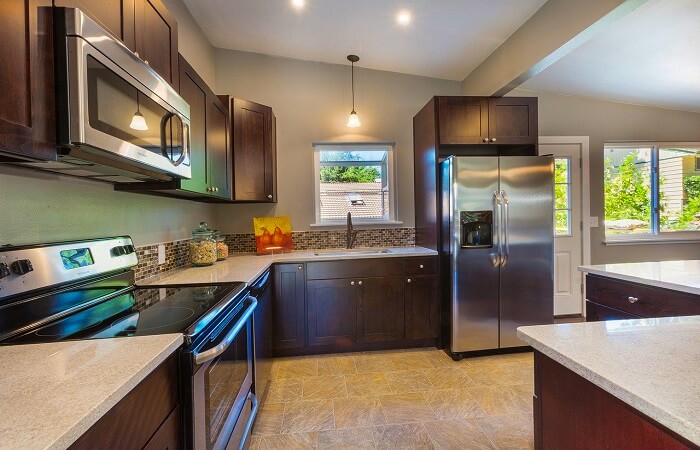
If you want to learn how to be tidy, go live on a yacht for a year, primarily traveling the open sea. Granted, that’s going to be an expensive ball to get rolling, and it’s going to be a bit dangerous. Once you’re “sailing”, though, you can fish out of the sea, reduce energy needs, and reduce housing needs; so there are offsets.
If you can’t do the yacht thing, maybe try an RV. That’s sort of like a “land yacht” if you will. Why will living in a yacht or an RV help you keep tiny areas clean? Well, these vehicles move, and things improperly stowed will fall all over the place. You can’t leave things on countertops, you’ve got to put them away. Also, you can’t leave garbage lying around.
Additionally, you learn to use cabinet space very efficiently. Because garbage piles up and won’t go anywhere if you don’t do anything, you also learn how to dispose of waste more appropriately. If you’re using septic systems in an RV, you’re furthermore conscientious about keeping your tiny bathroom clean.
That said, most people aren’t going to live “full-time” in a yacht or an RV. Even so, you can learn to be as fastidious about your home without such a polarizing experience through being intentional about not only cleaning but organizing what you own where you live. In this writing, we’ll briefly cover five tips in that direction.
1. Prune Possessions With Yard/Garage Sales, Etc.
You’ve got things you don’t need, and someone else could make use of those things. However, the question is, do those things hold any significance to you? Are they emotionally resonant? Are they heirlooms? Or are they just there collecting dust? If you’ve got an old Atari gaming system that’s been “in the garage” since before you owned a garage…why?
Sometimes these things get passed down for a long time and you just don’t need them. Old computers that are a decade past, old vacuum-tube TVs, faded cookery, blankets with more holes than thread, shoes that are so degraded you can’t even wear them—get rid of thee things.
Some items aren’t in bad shape, and you can sell them. Others should just be thrown out. Once you divest yourself of unnecessary clutter, you’ll have more and better storage space for the things that matter. Here’s a guide to garage/yard sales to help you see if this is the right move for your unwanted clutter.
2. Under-Space: Chairs, Couches, Beds, And Covers
You can drape properly colored, properly folded blankets over chairs, beds, or couches. If you do it right, the covers will reach the floor, and the chair will look as though such add-ons were intended. This is valuable because chairs, couches, tables, and beds often have free space beneath them.
If you just shove things there, that looks conspicuous. However, proper coverings hide the space, allowing you to utilize it for storage.
3. Cabinetry: Install New Cabinets Above Your Head
Cabinets can do a lot to expand storage. If you’ve got a nine-foot ceiling, and you’re under seven feet in height, you’ve got two feet of storage potential. You could install apartment kitchen cabinets that wrap around your kitchen without impacting either your ability to utilize the space or the style of the space.
Pots, pans, glasses, food, cookware, silverware, rags, placemats, spices, vitamins—they can all be more efficiently put away without impacting the space you occupy.
4. Multi-Purpose Furniture: Futons, Murphy Beds
The classic Murphy bed may not be as en vogue as it used to be. If you’re not familiar, these beds use springs and levers to fold up into the all. Now, a Murphy bed is going to eliminate storage potential beneath it, because you fold it into the wall when you’re done. But then again, you get all that space where the bed would have been. It’s a trade-off.
Futons give you both options. Things can be stored beneath them, and they can be folded out or folded in depending on what your needs happen to be. Find furniture items that can serve double-duty.
5. Be Conscientious About Cleaning And Disposing Of Refuse
This one isn’t popular, but it’s very relevant. Garbage piles up, and when you let it pile up, the prospect of cleaning the ever-increasing mess can be unattractive enough you continuously procrastinate. If you just clean up after yourself whenever you’ve got some sort of mess, this will diminish such a claustrophobic procrastination, and keep that “hoarding” situation away.
It’s a lot easier to clean when the prospect isn’t a big chore. When things aren’t cluttered, you can more efficiently utilize the space.
Making Small Spaces Seem Large
Conscientious cleaning, multi-purpose furniture, installing new kitchen cabinets, maximizing under-space beneath furniture, and pruning your possessions all represent fine, doable, effective ways of organizing your things in a small space. There’s a little work involved with getting the ball rolling, but once you establish good habits, you’ll keep them for a while.
